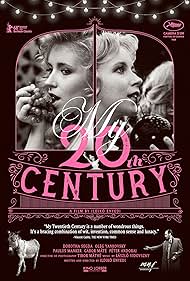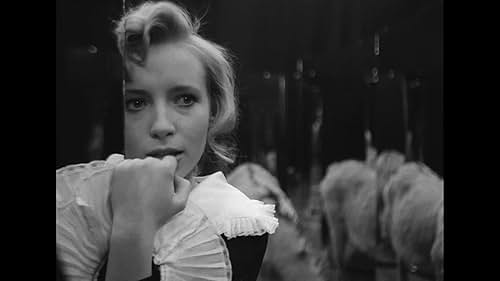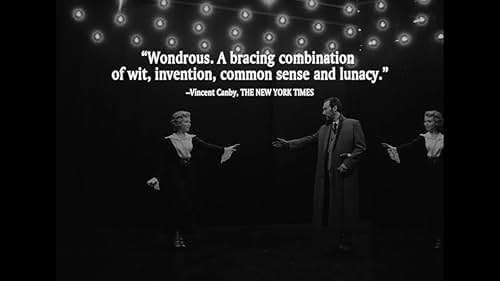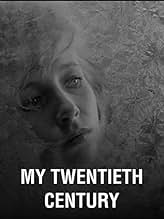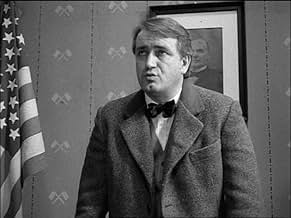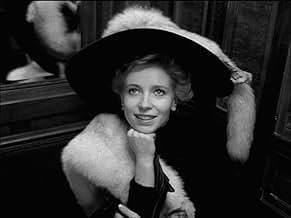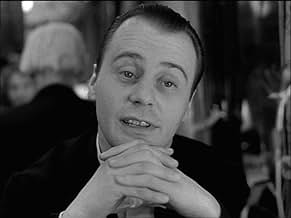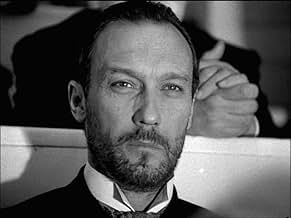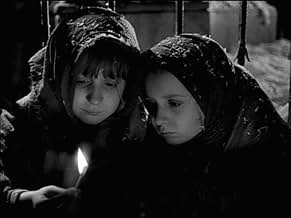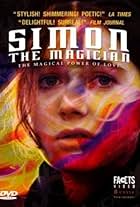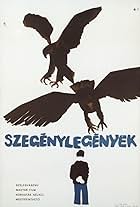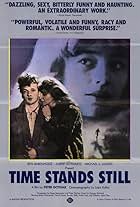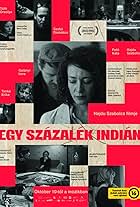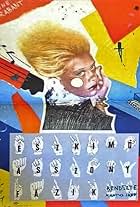VALUTAZIONE IMDb
7,0/10
2055
LA TUA VALUTAZIONE
Due sorelle gemelle, che sono cresciute separatamente, Dora una pseudo aristocratica e Lily una bombardiere anarchica, si ricongiungono attraverso Z, un misterioso viaggiatore dell'Orient-Ex... Leggi tuttoDue sorelle gemelle, che sono cresciute separatamente, Dora una pseudo aristocratica e Lily una bombardiere anarchica, si ricongiungono attraverso Z, un misterioso viaggiatore dell'Orient-Express.Due sorelle gemelle, che sono cresciute separatamente, Dora una pseudo aristocratica e Lily una bombardiere anarchica, si ricongiungono attraverso Z, un misterioso viaggiatore dell'Orient-Express.
- Regia
- Sceneggiatura
- Star
- Premi
- 1 vittoria
Trama
Lo sapevi?
- QuizVoted as one of the "12 Best Hungarian Films" ("New Budapest 12") by Hungarian filmmakers and critics in 2000.
- BlooperThe film takes place around 1900. In the projection room scene, among Méliès' films, there is an extract from "The General" by Buster Keaton which was shot in 1926. That is 26 years later.
- ConnessioniFeatured in Final Cut - Ladies and gentlemen (2012)
- Colonne sonoreMacbeth, Act 3: Coro e ballabile
Ondine e silfidi""
Written by Giuseppe Verdi
Performed by Andrea Mate, Budapest Symphony Orchestra, Hungarian Radio and Television Chorus, Istvan Gati, Janos Bandi, Janos Tóth, Katalin Pitti, Kolos Kováts, Lamberto Gardelli, Mária Zádori, Peter Kelen, Piero Cappuccilli, Sylvia Sass, Tamás Bátor
Recensione in evidenza
Hungarian female director Ildikó Enyedi's ON BODY AND SOUL (2017), her first feature in 18 years, is the recipient of 2017 Golden Berlin Bear, so it is high time to reappraise her under-seen body of work, here comes her dazzling Black-and-White feature debut MY TWENTIETH CENTURY.
Capitalizing on the monochromatic mystique of a bygone era, the story focuses on identical twins Dora and Lili (Segda, a ), born in 1880, after their mother died and selling matches on a freezing cold night in Budapest, they are snatched away and lead separate lives. Their path will converge again in 1900, the turn of the century on the Oriental Express. Dora, a pert minx, dallies her way through men's courtship and rooks them as much as she can, whereas Lili, a dour-looking revolutionist, carries on a bomb-attacking mission with steely resolution. Unbeknown to each other, both's lives will soon be entangled with a mysterious middle-aged man Z (Yankovskiy, a magnetic cipher-like presence), a constellation of vignettes are engendered by alternating between Dora and Lili in their aggressive/passive sexual/power tugs-of-war with an inscrutable Z: playing hard to get, coquettishly libidinous, complete obedient, that is the gist of femininity's unabashed duality, as a riposte to the sidebar, where the young Austrian philosopher Otto Weininger (played by Paulus Manker with gusto and ridicule), who would kill himself in 1903 at the age of 23, rants about his misogynistic take on women's "whore/mother" dichotomy in front of a flock of suffragettes. In the hyper-surreal denouement, Dora and Lili finally meet inside a hall of mirrors (a motif almost runs to platitude), later arrives Z, ushered by a mule, a metaphor of men's intransigence and if one recalls, it also heralds the twins' separation at the first place.
The surreal touch is what makes Enyedi's daring debut a novelty, picking up the baton from erstwhile Mitteleuropa New Wave standard bearers (Vera Chytilová's DAISIES 1966, Jaromil Jires' VALERIE AND HER WEEK OF WONDERS 1970, to name a few within the knowledge of this reviewer), Enyedi interpolates these elements to impart her rumination on more abstract aspects: nature vs. human (the monologue of a Zoo-trapped chimp, a lab dog on the lam confronting a railway train, other topographic arrangements), cosmology (Greek chorus of glistening stars), and technology (Edison's discovery opens and bookends the film, cinematograph, etc.), but this smorgasbord of ideas and conceptions fail to organically connect with the diegesis, a rookie indulgence for starters, often bite off more than one can chew - making every film as the last one. This approach does impinge on the cohesion of its central narrative, which could have been marshaled into a more scintillating doppelgänger charade. Yet, if eccentricity and diverse nuggets are what the filmmaker intends to chalk up, Enyedi has done a bang-up job!
Experimental but mesmerizing, compendious yet idiosyncratic, and particularly has a unique eye for lightning and mise-en-scène, MY TWIENTH CENTURY is a symphonic pastiche of cinematic tricks and an unsparing feminist manifesto beckons for a more effervescent reception.
Capitalizing on the monochromatic mystique of a bygone era, the story focuses on identical twins Dora and Lili (Segda, a ), born in 1880, after their mother died and selling matches on a freezing cold night in Budapest, they are snatched away and lead separate lives. Their path will converge again in 1900, the turn of the century on the Oriental Express. Dora, a pert minx, dallies her way through men's courtship and rooks them as much as she can, whereas Lili, a dour-looking revolutionist, carries on a bomb-attacking mission with steely resolution. Unbeknown to each other, both's lives will soon be entangled with a mysterious middle-aged man Z (Yankovskiy, a magnetic cipher-like presence), a constellation of vignettes are engendered by alternating between Dora and Lili in their aggressive/passive sexual/power tugs-of-war with an inscrutable Z: playing hard to get, coquettishly libidinous, complete obedient, that is the gist of femininity's unabashed duality, as a riposte to the sidebar, where the young Austrian philosopher Otto Weininger (played by Paulus Manker with gusto and ridicule), who would kill himself in 1903 at the age of 23, rants about his misogynistic take on women's "whore/mother" dichotomy in front of a flock of suffragettes. In the hyper-surreal denouement, Dora and Lili finally meet inside a hall of mirrors (a motif almost runs to platitude), later arrives Z, ushered by a mule, a metaphor of men's intransigence and if one recalls, it also heralds the twins' separation at the first place.
The surreal touch is what makes Enyedi's daring debut a novelty, picking up the baton from erstwhile Mitteleuropa New Wave standard bearers (Vera Chytilová's DAISIES 1966, Jaromil Jires' VALERIE AND HER WEEK OF WONDERS 1970, to name a few within the knowledge of this reviewer), Enyedi interpolates these elements to impart her rumination on more abstract aspects: nature vs. human (the monologue of a Zoo-trapped chimp, a lab dog on the lam confronting a railway train, other topographic arrangements), cosmology (Greek chorus of glistening stars), and technology (Edison's discovery opens and bookends the film, cinematograph, etc.), but this smorgasbord of ideas and conceptions fail to organically connect with the diegesis, a rookie indulgence for starters, often bite off more than one can chew - making every film as the last one. This approach does impinge on the cohesion of its central narrative, which could have been marshaled into a more scintillating doppelgänger charade. Yet, if eccentricity and diverse nuggets are what the filmmaker intends to chalk up, Enyedi has done a bang-up job!
Experimental but mesmerizing, compendious yet idiosyncratic, and particularly has a unique eye for lightning and mise-en-scène, MY TWIENTH CENTURY is a symphonic pastiche of cinematic tricks and an unsparing feminist manifesto beckons for a more effervescent reception.
- lasttimeisaw
- 15 apr 2017
- Permalink
I più visti
Accedi per valutare e creare un elenco di titoli salvati per ottenere consigli personalizzati
- How long is My Twentieth Century?Powered by Alexa
Dettagli
- Data di uscita
- Paesi di origine
- Lingua
- Celebre anche come
- My Twentieth Century
- Luoghi delle riprese
- Aziende produttrici
- Vedi altri crediti dell’azienda su IMDbPro
Botteghino
- Lordo Stati Uniti e Canada
- 682.016 USD
- Tempo di esecuzione1 ora 42 minuti
- Colore
- Mix di suoni
- Proporzioni
- 1.33 : 1
Contribuisci a questa pagina
Suggerisci una modifica o aggiungi i contenuti mancanti

Divario superiore
By what name was Il mio XX secolo (1989) officially released in India in English?
Rispondi